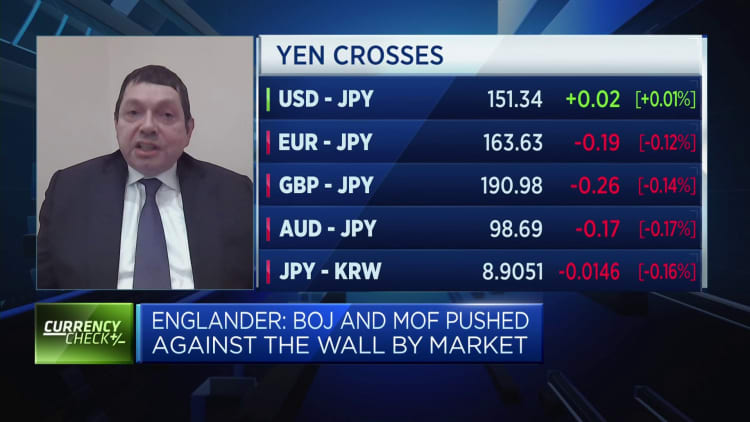
Japan is "very, very close" to intervening in the yen, Steven Englander, head of Global G10 FX research and North America macro strategy at Standard Chartered Bank, told CNBC as the currency languishes at multi-decade lows.
"I think we're actually very, very close to them [Japanese authorities] jumping in ... they've already discussed the political consequences and nobody's sitting there asking for a weaker yen," Englander told CNBC's "Squawk Box Asia" on Thursday.
The Japanese yen traded around 151.47 against the U.S. dollar on Thursday after falling to its weakest level in 34 years at 151.97 in the previous session.
These multi-decade lows have prompted market speculation over potential intervention of the currency.
Japan's finance minister Shunichi Suzuki had indicated this week that measures to "respond to disorderly FX moves" were not off the table. The vice finance minister for international affairs, Masato Kanda, reportedly said on Wednesday that the yen's moves were being watched closely and urgently.
Chief Cabinet Secretary Yoshimasa Hayashi said on Thursday that authorities will not rule out any measures to counter excessive currency moves, Reuters reported, echoing other members of administration that currency moves were being watch with a high sense of urgency.
Standard Chartered's Englander said potential intervention in the yen would be aimed at buying time for Japanese authorities until the U.S. Federal Reserve starts cutting interest rates or until the Bank of Japan hikes its rates a little more.
He further noted that when Japanese authorities last intervened in the yen in 2022, it "worked out pretty well," even though investors were initially skeptical of the effectiveness of such currency intervention.
The Bank of Japan ended its regime of negative interest rates in a historic move last week and abolished its yield curve control policy, which did little to stop the yen from weakening.
The Fed, on the other hand, held its benchmark rate steady as expected last Wednesday and signaled plans for multiple rate cuts before the end of the year.

